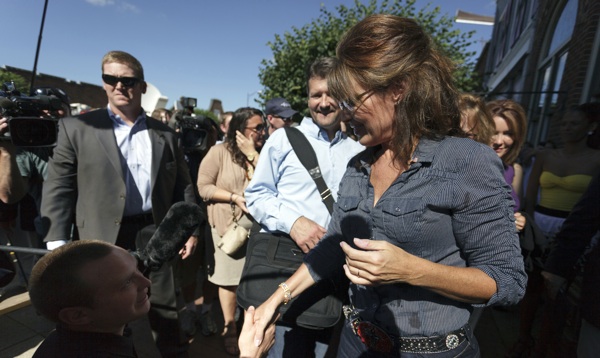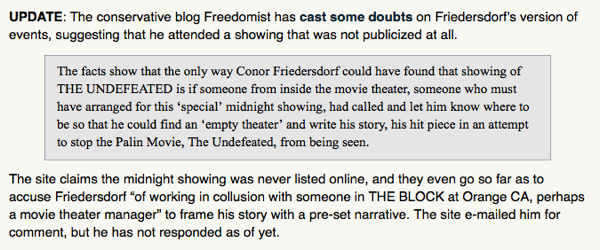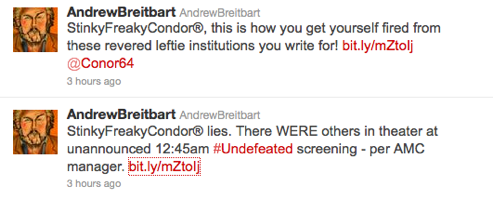How I Became the Subject of a Conspiracy Theory
The paranoid style in American politics is alive and well, as I learned after writing about the new Sarah Palin movie

Before I say something provocative about Sarah Palin, Andrew Breitbart, the mainstream media, and the culture wars, or revisit the short piece I wrote about "The Undefeated," I insist on airing a complaint. In four months as an associate editor at The Atlantic, I've argued the case that President Obama took us to war illegally in Libya, excoriated him for persecuting whistleblowers, insisted that he betrayed a central promise of his candidacy, and strenuously objected to his claim that he is empowered to assassinate American citizens without due process.
I've shown that the DEA callously prevents sick people from getting useful therapy, highlighted work done by the Institute for Justice to advance economic freedom, called out the TSA for its harassment of air travelers, noted that kidney patients are dying needlessly, urged on efforts to rein in excessive public employee pensions in California, called for a repeal of the light-bulb law, highlighted Orwellian threats to privacy, and complained that federal prosecutors misallocate resources.
I've profiled Gary Johnson, formulated 11 questions all presidential candidates should be asked to test their civil liberties bonifides, urged the tea party movement to embrace Mitch Daniels, warned against the inexperience of Michele Bachmann, and even curated nearly 100 fantastic pieces of journalism!
Despite those pieces and many others (267 items over almost four months, to be exact), the highest traffic thing I've written, the most liked and the most hated, the most quoted, linked, commented on, praised, excoriated, and widely controversial, is a lighthearted item about going to "The Undefeated" last Friday to interview Sarah Palin supporters, and finding none of them there.
Why?
One answer is that, despite the protestations among her critics that Palin is a media driven phenomenon, people want to consume Web items about her. It's a revealed preference. At present, 47,000 people have indicated on Facebook that they "like" my piece. Don't get me wrong. I tried my best to salvage what I took to be a failed reporting trip with as solid a 3 a.m. PST write-up as I could manage. I sincerely appreciate that so many folks thought it succeeded. But only a sixth as many people "liked" what I am confident in calling a damn good list of exceptional non-fiction that took many weeks of work to compile, and that affords delightful reading to last months! Is it any wonder that magazines, newspapers, and blogs keep covering Palin?
What bewilders me even more are certain people who didn't like the piece. I don't mean critics like John Nolte at Big Hollywood. He is characteristically unfair to various publications, and to me too. But his core argument, that my piece was irresponsibly used by other media outlets in service of a larger narrative about the movie's failure, is partly true. I reported, quite explicitly, from one theater. It was an interesting, legitimate data point. Obviously, AMC was surprised no one showed, or they wouldn't have scheduled the 12:01 am screening, and people used to line up overnight, even in freezing temperatures, for Palin-related events, so the fact that her middle-aged fans in Orange County wouldn't turn out for a midnight movie certainly wasn't obvious.
At the same time, the Palin movie has done better in subsequent screenings, according to various reports around the Web: at least one sold out screening in Texas, for example, another in Georgia, and a Friday morning screening in Orange County where the theater was reportedly a third full. It is still far too early to gauge how the movie is going to perform overall. The opening weekend receipts were the very low sum of $75,000, though as yet it's only playing in ten cities.
The fact that so many people imagine I am invested in the movie's failure, or that anyone cares deeply about its box office performance other than the filmmakers themselves, is frankly baffling to me. As I said in my piece, I expected to find a crowd when I arrived at the theater. As I drove home that night, I had no idea whether its absence meant that the movie would flop, or meant nothing at all. Various conservative blogs are investing a lot of energy into arguing that the movie is in fact succeeding, and I don't understand that either. It's perfectly useful to report on other showings. But what is ultimately at stake? Say it earns billions. Is that going to shrink the federal government? Or reform entitlements? Or affect the foreign policy America adopts? Why would an ideological movement that insists the country is going down the tubes waste so much time and energy complaining about their perception that a movie is doing better than the MSM says?
That brings me to the folks I am here to lambast: William Collier, a conspiracy theorist extraordinaire; the people who should know better but took him seriously; Andrew Breitbart, once again showcasing his deeply unethical approach to public life; and the subset of Sarah Palin fans who've joined in writing the most vile things about me in the days since my piece originally ran. I desire to set the record straight for anyone who took their various lies and distortions as truth-telling. And to illustrate a glaring hypocrisy that Palin fans would do well to repudiate.
Bear in mind the righteous critique that the folks mentioned above aim at "the mainstream media": we're quick to spread sensationalized stories; negligent or malicious in publishing inaccurate material that destroys reputations; motivated by point-scoring more than truth; and morally depraved in the insults we hurl at ideological adversaries. There are certainly media outlets which fit that description. This isn't one of them. In any case, they claim to detest these pathologies.
Yet they engage in the very unethical behaviors that they allegedly abhor.
Let's start with inaccurate rumors intended to destroy reputations. That's what Collier has published about me. Identifying himself as someone involved in the marketing of "The Undefeated," he asserted on his blog that a midnight showing in Orange County, where I saw the film, was never scheduled or advertised. "The only way" I could've seen the movie, he speculated, was by arranging a "secret showing" with a cooperative employee inside the AMC chain.
Showing what I thought to be admirable restraint, I e-mailed the man:
Bill, I am going to presume that you've made an innocent mistake, but I expect you to correct it. Attached is an image from the Los Angeles Times dated Thursday, July 14, 2011. The movie was advertised there, just as you'd expect, and contrary to the assertion in your post that "there has never been any mention of or advertising for any midnight showing." The movie was also advertised on Google, where I found it. I Googled "Sarah Palin, The Undefeated" and the first result was movie times at the AMC Theater at The Block. (Unsurprisingly. I am staying in Orange County, very close to there.) So will you now apologize and correct your item?
His response?
The film's listing in the LA Times only proved "how elaborate such a setup could be." Like all conspiracy mongers, he incorporated the new information into his ever-evolving theory, even updating his post. He also sought to place an op-ed in The Daily Caller repeating his bizarre accusation. To their credit, a fact-checking staffer emailed. I sent him a scan of the same movie listing.
He said he'd reject the Collier piece.
Had everyone else done two minutes of due diligence, it would've ended there. Instead, Sarah Palin fans, who complain constantly about journalists passing on unsubstantiated rumors, proceeded to Tweet, ReTweet, and approvingly link the conspiracy theory. Incredibly, Mediaite also treated it seriously. Having earlier linked to my item, staffer Josh Feldman updated as follows:

Perhaps I am biased. I understand that Feldman was just trying to do his job, and I bear no ill will toward him. But is there no threshold of plausibility that an allegation must pass to be uncritically publicized? Is it even possible that a manager at a multi-billion dollar theater chain agreed to reserve a screen on the night that Harry Potter opened for a secret showing of a movie? So that a magazine journalist could get in what wasn't even actually a dig at Sarah Palin? Is the allegation perhaps iffy enough to warrant contacting me before airing it? Or, say, calling the theater? Or checking the newspaper of record in the area, which would have confirmed that the movie was listed? But hey. Everybody makes what, to me, was a mistake. As soon as I e-mailed Colby Hall, one of the site's editor, he updated the piece with the pertinent information.
Truly, no hard feelings.
Less professionalism has been shown by Breitbart. The man constantly rails at the mainstream media. He is self-righteous. Indignant. In his telling, journalists are bad people. They publish frivolous innuendo and ad hominem attacks. Due to these smears, they're undeserving of their sizable platforms, or the respect of the American people. Here is what Breitbart tweeted to his 51,765 Twitter followers:

And:

Said Collier in his e-mail to me, "Rumor has it that Breitbart will also be looking into your journalistic practices." Thankfully, I haven't given any speeches to the NAACP, so he can't publish misleading excerpts. I just hope like hell that he doesn't send James O'Keefe to seduce me.
There were attacks aplenty besides. On the personal blog of Dan Riehl, a contributor to Breitbart's sites, I came across this lovely headline: "Conor 'Pee Wee Herman' Friedersdorf Exposes Himself To Female At Palin Film Showing." I'm sure Breitbart will censure him any minute now. And Saturday at Breitbart's site, Big Hollywood, writer Larry O'Connor speculated that I lecherously approached the two young female moviegoers who I quoted in my original story. But Breitbart hates media workers who traffic in cheap smears, character assassination and innuendo.
The hate didn't end with them.
Said one guy on Twitter: "I hear that CONOR FRIEDERSDORF is dickless." There were hostile e-mail messages too -- perhaps if they keep coming in, I'll qualify to be the subject of a Matthew Continetti book titled "The Persecution of Conor Friedersdorf." I jest, but not without a point: the hordes that go after Sarah Palin critics online aren't representative of all her fans, but they do refute the notion that the former Alaska governor is alone in being subjected to objectionable attacks, or that conservatives and "real Americans" would never behave in that depraved way. Lots of Palin fans don't seem particularly bothered by conspiracy theory, character assassination, or ad hominem attacks when they're undertaken by ideological allies against other people.
If I might address Sarah Palin fans directly: early in "The Undefeated," there is a montage of celebrities saying vile things about the former Alaska governor. The celebs come off as mean-spirited jerks. And rightly so. But are your favorite conservative celebrities so different? Scroll through a week of Andrew Breitbart's Twitter feed (though not if any kids are around). Read this Mark Levin exchange. Watch Rush Limbaugh mock how Chinese people speak. Do you see that they're the right-wing analogues of the celebrities you justifiably criticize? That you give them a pass for the most offensive comments merely because they're on your side -- and that if they were liberals, and behaved in the same way, you'd condemn them in the strongest terms?
Says Breitbart, ever classy:

What opinion would you have, Palin fans, of a media figure who said that it is proper to use the term "fecal" to describe her? Why do you not feel the same way about Breitbart? Could it be that like "the lamestream media" you criticize, a glaring double-standard cripples your judgment?
The scatological insult isn't even the worst thing about that Tweet. I'd like to address the lie, frequently uttered by Breitbart and repeated endlessly by others, that I misrepresent my ideology. Speaking directly to those of you who've found me through him: On many occasions, I've written openly and at length about my ideological beliefs and biases. I did so in my first post after becoming an associate editor at The Atlantic. And I very publicly described myself as "of no party or clique" and moving toward "pragmatic libertarianism" on Andrew Sullivan's blog. I have even complained when other writers referred to me as a conservative in an attempt to use that characterization as a cudgel against the right. So what's going on? The Breitbarts of the world require, as an intellectual crutch, labeling those who disagree with them. Unable to win arguments on the merits, they must separate the world into Team Red and Team Blue. The biggest threat to their intellectual scam? People who disagree with them, but can't be dismissed as ideologically hostile.
Thus the outsized disdain the hard right has for folks like David Frum, David Brooks, Bruce Bartlett, and other "RINO heretics." Thus the habit of referring to me as "a leftist." And insisting that everyone must be labeled.
However labeled, I'd eagerly replace Barack Obama with Gary Johnson in hopes of ending unnecessary foreign wars, means testing Social Security and Medicare, ending the drug war, ceasing plans to assassinate Americans sans due process, stopping warrantless surveillance, increased localism, cutting back on the excesses of public employee unions, reforming the criminal justice system, simplifying the tax code, legalizing gay marriage, and aiming appropriate disdain at conservative talk radio hosts and their analogues in Hollywood. Of course, Johnson won't win the GOP nomination, so I'm an undecided voter who may write in "none of the above" in 2012.
I would've elevated Mitch Daniels. Even Romney's got a shot at my vote. But Palin?
Not a chance.
If that makes me a "fake conservative," or a "leftist," or an "Alinskyite," or whatever the slur of the day is, note that there are a lot of us Palin skeptics out here. We aren't all antagonistic to Palin fans. Speaking for myself, I think you're mostly good people, and just as you disagree with my judgment in candidates, I disagree with yours. And then folks in conservative media tell lies about me in order to make you think that I and others are conspiring against you. They're manipulating you.
This isn't a post or a controversy about whether Sarah Palin should be president. It's about journalism, paranoid conspiracy theories, the culture war, and the treatment other people are owed in public discourse. Why do I resent like hell being attacked by Collier, Breitbart and certain Palin fans? Because conspiracy theorists, profane bullies who've published egregiously misleading material on prior occasions, and Internet trolls who call me dirty names on Twitter haven't earned the right to engage in self-righteous media criticism and be taken seriously. Especially when the criticism itself is riddled with inaccuracies.
I close with a thought experiment.
The year is 2012. Al Gore and Michael Moore release a big budget polemic/documentary together. The subject doesn't matter. Theaters are permitted to start showing it on a Friday, and eager to get a jump on things, a movie house in Berkeley screens it at 12:01 am. Three conservative journalists attend together: Bill O'Reilly for Fox News, James O'Keefe for the Breitbart sites, and a third for Human Events. Upon arriving, however, they find they're the only ones there. In Berkeley, California, no one showed up to the debut! Here's the question, critics of mine: Do you think that would be a story? Would they cover it? Would they refrain from making larger speculative assertions about what it meant for the success of the film, as I refrained from doing in my Palin piece?
Exactly.
Image credit: Reuters